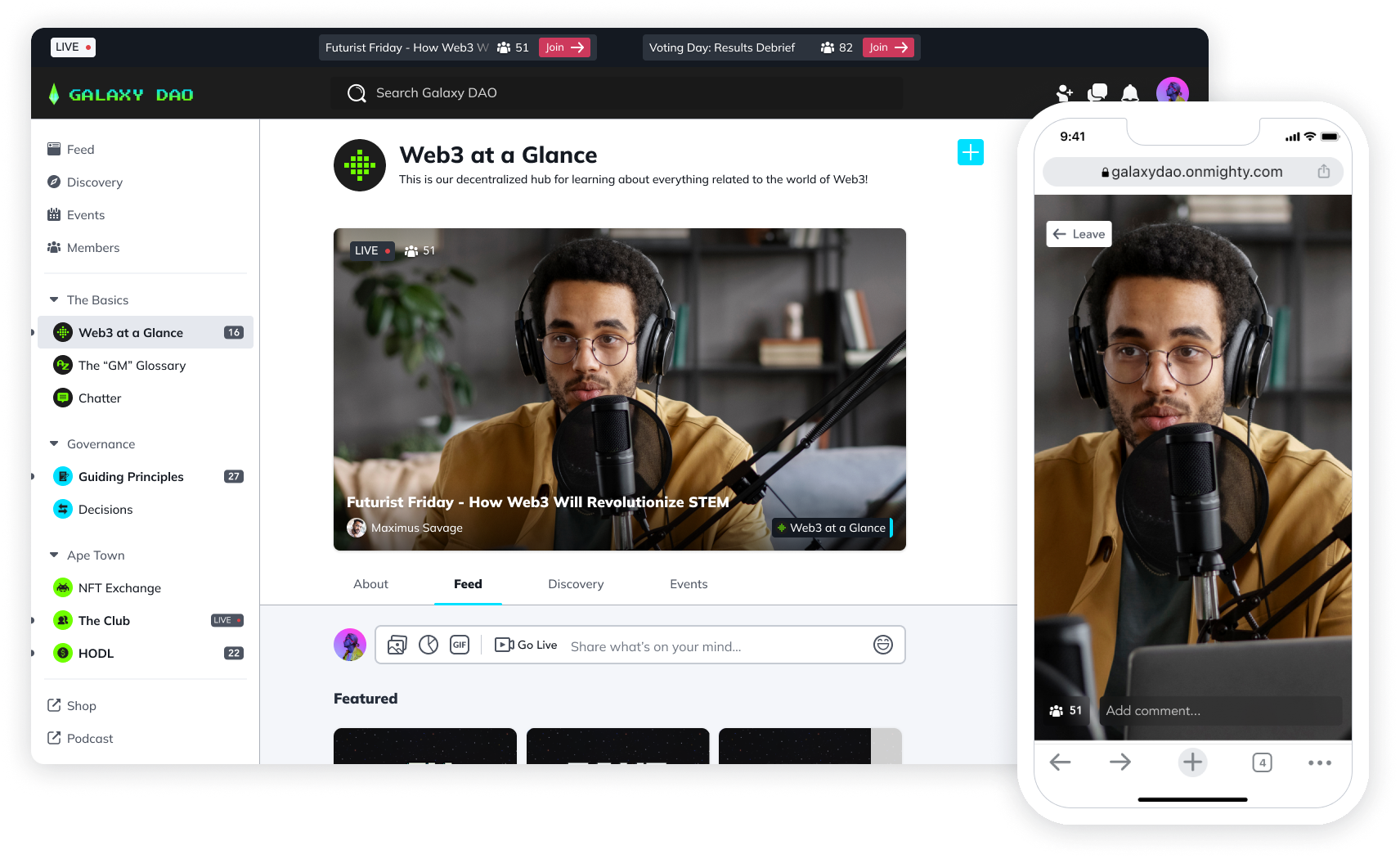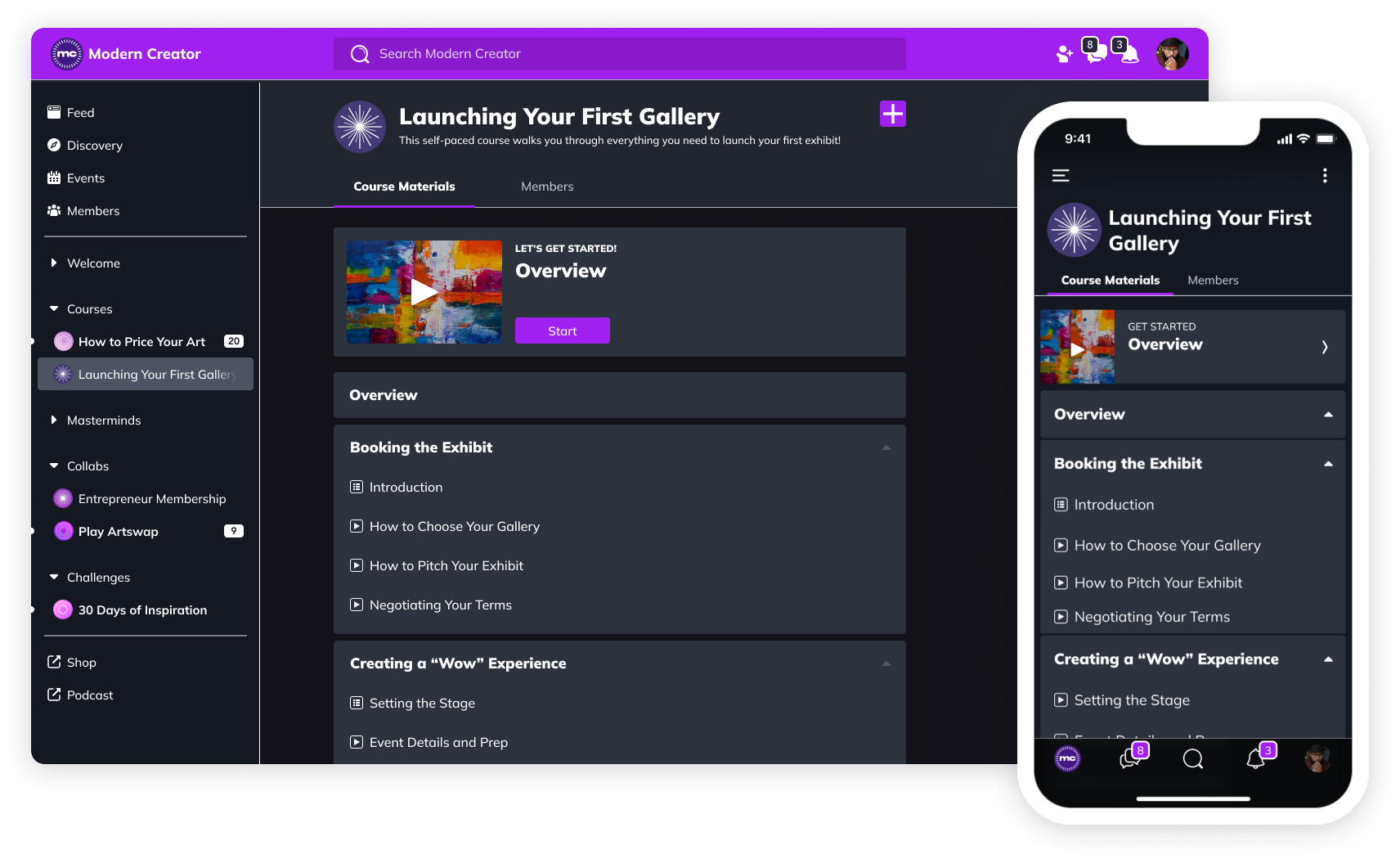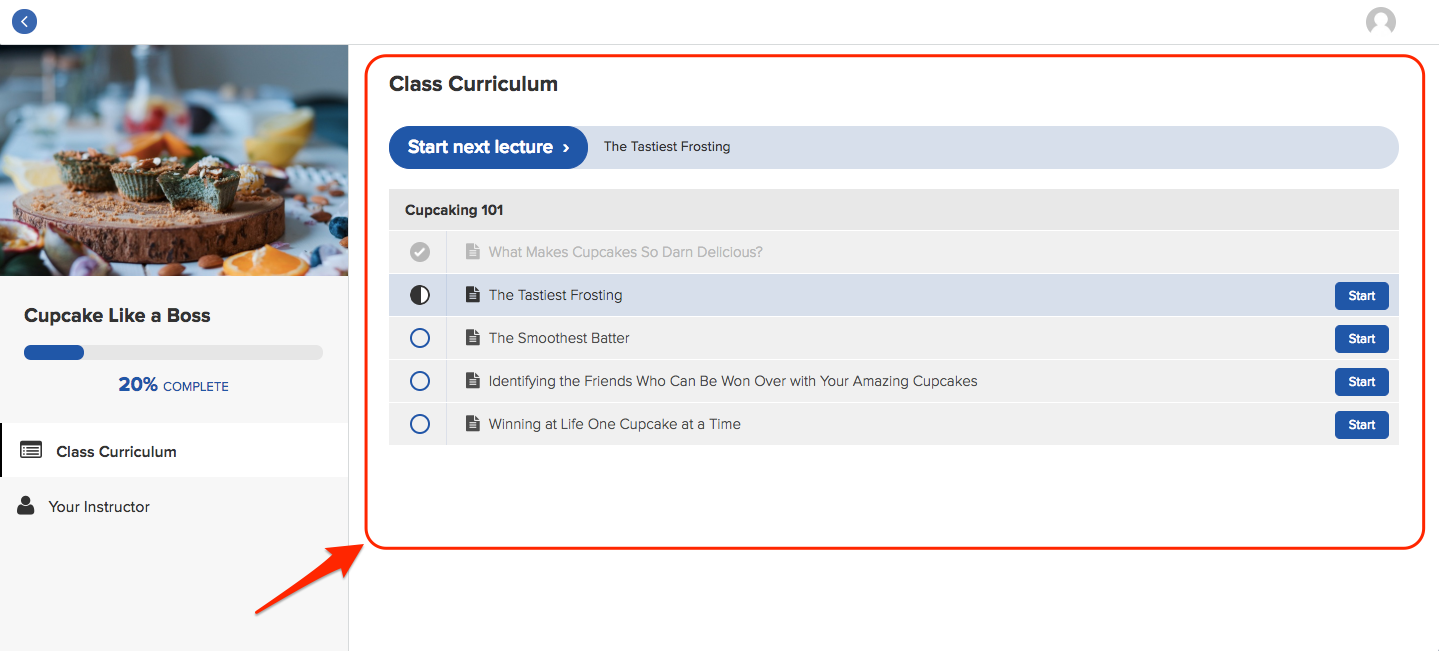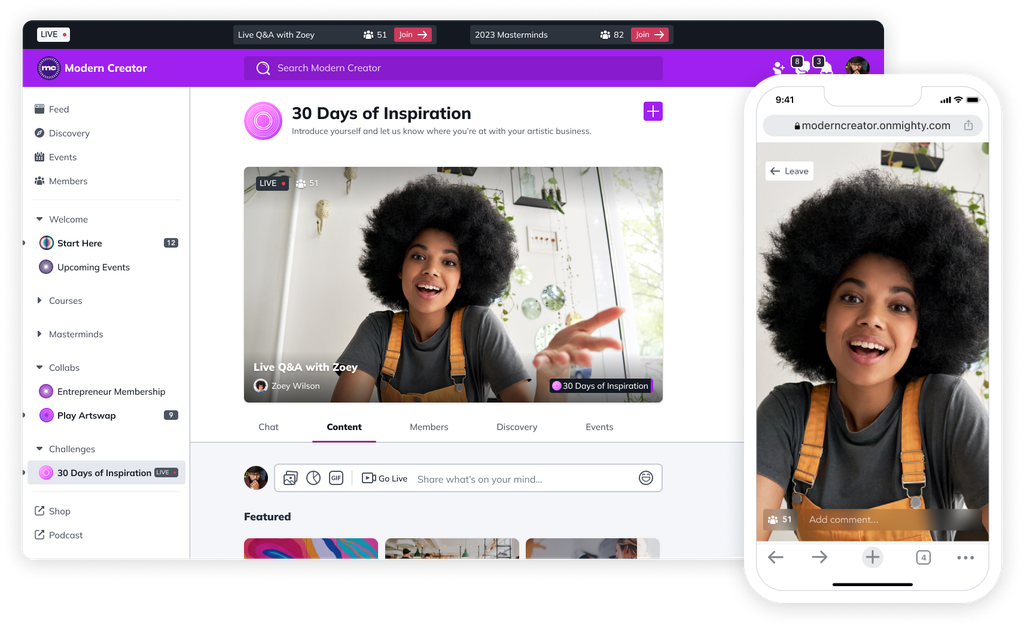Online Courses
The Ins & Outs of Online Course Hosting
Unsure of where to host online courses? Don’t sweat it, we’ve got you covered.
Author
Phillip Russell
Last Updated
February 6, 2025

Table of Contents
If you’ve been thinking about teaching an online course, there’s never been a better time than right now. Whether you’re an online course expert or someone who is just starting out, online course hosting is a major choice you’ll have to make to get the ball rolling.
Thankfully, there are a number of good online course hosting platforms out there that will give you powerful features and flexibility. We’ve compiled a list of where to host online courses so your search is easier.
Ahead, we’ll explore key steps to take before building an online course. Then we’ll break down how to deliver online courses. And finally, we’ll break down the best places to host online courses.
If you want more support in building your online course and community, come join OUR Mighty Community for free and meet other new and established community owners! We’d love to meet you. Join for free!
Two essential steps to take before building an online course
Before we can talk about where to host an online course, we thought it’d be helpful to unpack what the most successful online courses all have. We’re believers that if you take the time to plan out your online courses thoroughly, you’ll be set up to succeed.
Choose an exciting course topic
This might seem like a no-brainer, but choosing an exciting topic for your online course is an important first step in the process. But what do we mean by “exciting”? We believe that whatever topic you choose —whether it’s how to start a business, mindful yoga practices, or something else—you should be just as excited about the topic as your students. When you’re deeply invested in the subject your enthusiasm will rub off on others.
A worthwhile distinction to make here is that you don’t have to be an expert to know how to deliver online courses. If you are an expert on whatever topic you’re teaching, that’s great! But you can also be an enthusiast or simply someone who is teaching people the skills you’ve gained along your own learning journey.
The most important thing to do when choosing a topic for your online course is to be specific. For instance, instead of running a “how to paint” course pick a specific medium. Let’s say you made a “how to paint with watercolors” online course, that not only is easier to teach than a broad course like “how to paint.” But it also sets expectations for your potential members.
Figure out who you’re trying to reach
The second step for how to deliver online courses is to narrow down who you’re trying to reach. Another way of saying this is to get specific about who your ideal student is. Why? Because when you know who you’re trying to reach you’ll have a better idea of what kinds of content will best appeal to them.
If you’re wondering how you can narrow down your audience, consider these questions:
Are they young people looking for a new skill or joining the workforce?
What goals or aspirations do they have?
Why are they looking for an online course instead of an in-person course?
What makes your perspective valuable for them to hear?
If you can answer these questions then you’re one step closer to launching your online course.
How to get started with online course hosting
Before we jump into where to host online courses, we thought we’d go over some important elements for online course hosting in general.
Research what’s out there
Do you know what makes building an online course easier? Researching what other creators have already done. There are a few reasons for taking the time to get a lay of the land for your online course topic.
First, when you see what’s out there, you can tailor your content to be different from the competition. Creating an online course is a great aspiration to have, but we can’t front: It’s a popular market these days so you have to stand out from the pack. When you take the time to research what others are doing, you’re basically getting a headstart. Use their work as inspiration and change what you feel isn’t working.
Secondly, doing your research directly contributes to your search for where to host online courses. When you research what other creators have done, you’re not just looking at their content. It’s also a chance to play around with various online course hosting platforms to see which one gels with your needs and style.
Create a roadmap for your online course
A key component of any online course is communicating clearly the goals of the class to your members. This means that your members by the end of the course will have tangible achievements and outcomes from completing your course content.
But you might be wondering how you can ensure that your messaging is clear to members. When you’re designing your course, think about the function and outcome of each piece of content you release. Everything should have forward momentum that pushes your members closer to achieving their goals.
Plan your pricing
When you create an online course you’re providing people a pathway to achieve goals they couldn’t on their own, that’s incredibly valuable. We believe that people should be paid for the work that they do and because of that figuring out a pricing plan for your offerings is important.
But while we think getting paid for your work is important, it can be challenging actually figuring out what that looks like. Ultimately, pricing your online course is a very personal decision. Here are two questions to consider:
What price would energize you? Another way to think about this is what kind of pricing model would energize you to invest deeply in the online course you’re building. For some people that price will be higher than for others. Take some time to figure out how online courses will fit into your life.
What are you trying to build? The price of your course also can correspond to the size of your class. If you have a higher price, you might have fewer students, but they are more invested in what you’re offering. If you offer a low price of entry then you might have more students which can be more work. Take the time to figure out what you’re trying to build and how the price will factor into the scope of it.
If you take the time to answer these two questions, you should have a clearer understanding of what pricing will mean for you and your online course.
Where to host online courses
Now that we’ve explored the important aspects of how to deliver online courses, we can look at where to host online courses.
When it comes to choosing an online course hosting platform it will ultimately depend on what you’re hoping to build. We’re believers in choosing software that will grow with your aspirations.
Ahead, we’ve picked three online course hosting platforms that offer robust features to design, build, and deliver online courses.
1. Mighty Networks
Powerful Cultural Software Platform

Mighty Networks started out as a world-class online community platform, but quickly expanded into offering online courses and paid membership services. Today, Mighty is a powerful cultural software platform that lets you mix courses, content, community, and commerce.
If you’ve been wondering where to host online courses, we believe that the best online course builders are ones that can morph and change depending on where your interest lies. With a Mighty Network you gain features like these and many more:
Discussion boards (where you can post images and files)
Polls, Q&As, and live-event integrations
Online course building tools
The ability to livestream in your network, native live video support, video storage options, and more.
Monetization options (you can charge for community access, online courses, and virtual events)
Member profiles, activity feed, and direct messaging

On top of a robust feature set that grows with your brand, Mighty Networks offers an experience that is available across web, iOS, and Android devices. That means your members can access your online community no matter where they are. It doesn’t get much better than that in online course hosting platforms.
2. Teachable
Solid course-only platform
Teachable is an online course platform known for offering easy-to-use customization features. Over the years they’ve become one of the more popular suggestions for where to host online courses.
When you choose Teachable, you’ll get a “power editor” tool that allows you to build multimedia course content like video lectures, and live coaching sessions. In addition to that, they offer a range of third-party surveys you can deploy for your members to interact with.

In addition to solid customization options, Teachable also provides creators with a few different methods to monetize their online courses. You can build sales pages and even pay members who take on administrative/moderation roles in your course.
Despite the advantages listed above, Teachable falters when it comes to offering creators tools to build their online communities. Part of any successful online course is the community that is formed along the way. On top of that, Teachable is only available on web and iOS making them accessible, but not the most accessible option out there for your members.
3. Thinkific
Thinkific is another platform many will recommend for online course hosting. They are specifically known for offering a focused feature-set around creating content.
On Thinkific you can build and sell online courses with fairly seamless third-party integrations. They allow you to deliver dripped courses (where you release content as you create it) as well as full course content drops all at once.
As is the case with all of the platforms we’re exploring in this article, Thinkific hosts and manages your course so you don’t have to worry about daily development woes or website building issues.
The weakness of Thinkific’s platform begins to show up quickly when you explore their community building features. That’s because they basically have nothing to offer you…That may seem harsh, but Thinkific doesn’t have community options, live events, in-person coaching, or any event-based learning.
While it’s undeniable that Thinkific has a robust set of tools to build an online course, their platform isn’t built to grow with you and the community you will form.
Want to try Mighty Networks?

While there are many different platforms to choose where to host online courses, we believe what’s been built at Mighty Networks is the best. Why? Because when you learn how to deliver an online course through Mighty Networks you’re setting yourself up for success by opening up to more possibilities.
Whether you’re launching an online course for fitness at home or novel writing, the easiest way to do that is by starting with an awesome platform.
Ready to launch your online course and community?
Ready to start building your community?
Start a free 14-day trial to explore Mighty—no credit card required.
More like this
Join Mighty Community
Learn the principles of Community Design™ (and see them in action) alongside thousands of creators and entrepreneurs. It's free to join!

Online Courses
Creating a Course
Teaching a Course
Course Platforms
Selling a Course
Communities & Memberships
Community Platforms
Managing a Community
Building a Community
Growing a Community
Monetizing a Community
Creators & Entrepreneurs
Monetization
Content Creation
Starting a Business
Website Builders
Creating & Managing a Website
Events
Event Platforms
Hosting & Marketing Events
Branded Apps
Creating a Mobile App
Coaching Apps
Community Apps
Coaching
Mastermind Groups
Starting a Coaching Business
Coaching Platforms
Filter by Category
Online Courses
Communities & Memberships
Creators & Entrepreneurs
Events
Branded Apps
Coaching
Start your free trial
14 Days. No Credit Card Required.





















